|
|
|
Sort Order |
|
|
|
Items / Page
|
|
|
|
|
|
|
| Srl | Item |
| 1 |
ID:
155370
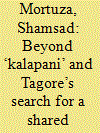

|
|
|
|
|
| Summary/Abstract |
In 1927, Rabindranath Tagore wrote a series of letters during his ‘pilgrimage’ to the countries of the Southeastern Rim of the Indian Ocean. He was convinced that India had forgotten its ‘gained’ territory that could be traced in some of the local customs and cultures. The presence of stories from the Puranas including The Ramayana and The Mahabharata led Tagore to believe in a larger imaginary Indianness outside its political realm. He held the imposition of ‘kalapani’ – the Hindu religious sanction against crossing the ocean – as a stumbling block that had eventually forced India to isolate itself. For him, without any concerted vision, it was impossible to attain true unity through ‘lip-union from public platforms’ [Tagore, R. (2010). Letters from Java (I. Chaudhurani and S. Roy, Trans., and S. Roy, Ed., p. 73). Kolkata: Visva-Bharati]. Recent scholarship has problematized the civilizing force of Indic values that Tagore expounded in his Letters from Java. However, Tagore’s call for consciousness building to rediscover and refine the common areas of Asian tradition and culture merits revisiting. Thus the paper purports to chart the cartography of the minds that once united different places and constituted a cultural capital as well as to survey the various metaphorical implications of ‘kalapani.’
|
|
|
|
|
|
|
|
|
|
|
|
|
|
|
|
| 2 |
ID:
155374
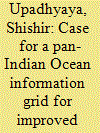

|
|
|
|
|
| Summary/Abstract |
The Indian Ocean region, in recent years, has witnessed a proliferation of information centers which have emerged in response to various sub-regional requirements and sometimes representing diverse interest groups. This paper highlights the gaps in regional maritime domain awareness (MDA) and argues that the multiple disparate information systems have not contributed to improving overall maritime safety and security in the Indian Ocean region. It puts forward a case for a pan-Indian Ocean information grid that could integrate the various information sources to provide comprehensive MDA for the region.
|
|
|
|
|
|
|
|
|
|
|
|
|
|
|
|
| 3 |
ID:
155373
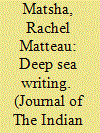

|
|
|
|
|
| Summary/Abstract |
Oceans have occupied our imagination since time immemorial, both in symbolic and in practical ways. The Indian Ocean is a region characterized both by complex economic, historical, cultural, and social entanglements. Memories of recent and distant pasts plumb oceanic depths, needing to be carefully recollected and sieved to make sense of the present, and imagine possibilities for the future. The ocean is thus read as a site of contested struggles, a space where historical identities and stories interconnect. Storytelling is one device through which personal and collective memories can resurface and be questioned, as can be observed in the work of South African-born Mauritian writer and activist Lindsey Collen. This essay discusses Collen’s outlook on the Indian Ocean region, and on Mauritian literature and socio-political landscape. Building on previous work and research on Collen as a major activist and literary figure in Mauritius, this paper is based on a series of interviews and conversations with Collen and the two authors.
|
|
|
|
|
|
|
|
|
|
|
|
|
|
|
|
| 4 |
ID:
155369
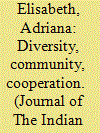

|
|
|
|
|
| Summary/Abstract |
The Indian Ocean Rim Association (IORA) has three main pillars with different focuses and functions. They are namely the Indian Ocean Region-Business Forum (IOR-BF), the Working Group on Trade and Investment (WGTI), and the Indian Ocean Rim-Academic Group (IOR-AG). During 2015–2017, Indonesia has been the Chair of IORA, and successfully implanted a new initiative to help IORA to promote more solid economic integration in the Indian Ocean region. Indonesia hosted the first IORA Summit where the IORA Concord was also first announced in March 2017. It was a very historical moment when Indonesia’s initiative was undertaken during the 20th anniversary of IORA.
|
|
|
|
|
|
|
|
|
|
|
|
|
|
|
|
| 5 |
ID:
155749


|
|
|
|
|
| Summary/Abstract |
Islands are intrinsic parts of the Indian Ocean Region’s physical geography and human landscape. Historically, many have played substantial roles in the regional cultural and economic networks, as well as in the regional political developments. Today, at least three issues bring these islands back to the forefront of the regional and global affairs, namely environment, ocean and geopolitics. However, there has not been yet a lot of research and publication on this phenomenon of islands’ growing significance in the specific context of the Indian Ocean Region.
|
|
|
|
|
|
|
|
|
|
|
|
|
|
|
|
| 6 |
ID:
155372
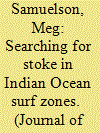

|
|
|
|
|
| Summary/Abstract |
This article takes up the idea of Indian Ocean ‘natural logics’ while shifting attention from ‘cultures of trade’ to leisure culture, and from monsoon winds to waves. Surfers who ride these bands of moving energy describe the experience as one of being ‘stoked’, and the search for stoke has over the past century propelled them around the world ocean in pursuit of the perfect wave. Focusing on the Indian Ocean arena, the article traces three distinct yet not necessarily sequential waves of surf travel therein: the ‘surfari’ and the concealment/exposure of secret spots; enclaves of consumption in the offshore coliseum; and, the swirling shore-break in which the energy parcel conveyed through the ocean is unloaded on the coast. In the process, it explores what insights Indian Ocean studies bring to cultural histories of surfing and how surfing practice has been reshaped as it moves out of its traditional Pacific – and then Atlantic – locations, along with the ways in which surfing has in turn reconfigured the Indian Ocean littoral. The article concludes by shifting mode from critical commentary in order to present the shore-break as a dynamic concept-metaphor for materializing immersed and energised scholarship.
|
|
|
|
|
|
|
|
|
|
|
|
|
|
|
|
| 7 |
ID:
155371


|
|
|
|
|
| Summary/Abstract |
With point of departure in the emic concept of ‘two feet,’ the article explores how transnationalism by ‘keeping a foot in the door’ is being practiced among people of Indian origin living in Tanzania. Indians settled in East Africa in the late nineteenth century and since the end of colonial rule they have been aware of distributing different citizenships within the families in order to stay transnationally mobile after independence. Numerous Indians moved to the U.K. and Canada in the years following independence and those who stayed back made sure to ‘keep the door open’ and thus secure a potential future abroad. ‘Two feet,’ the article argues, is a practice that ensures a necessary level of social protection for the East African Indians. Shedding light on ways in which lifeworlds stretched across national borders unfold on a micro level, the article shows how ‘two feet’ is a gendered practice in which women’s purity becomes intertwined with transnational mobility and the potentiality of different places.
|
|
|
|
|
|
|
|
|
|
|
|
|
|
|
|
|
|
|
|
|